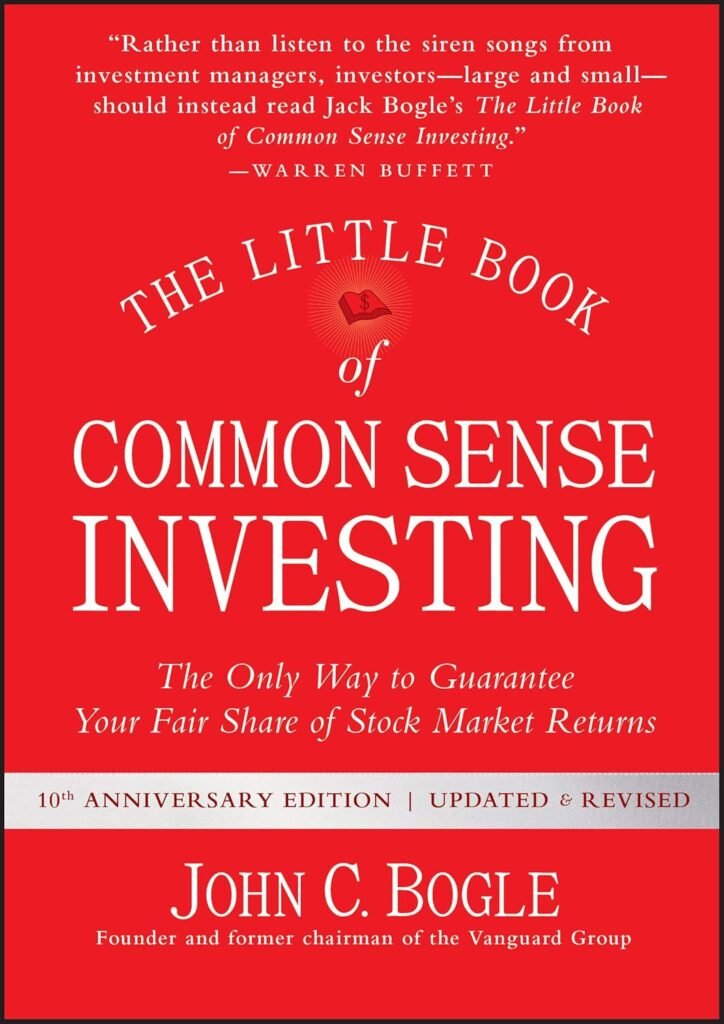Have you ever wondered how to make the most of your investment opportunities without being overwhelmed by the complexities of the stock market? If so, “The Little Book of Common Sense Investing: The Only Way to Guarantee Your Fair Share of Stock Market Returns (Little Books, Big Profits) Hardcover – Illustrated, October 16, 2017” might just be the guide you need. This remarkable book by John C. Bogle, the founder of Vanguard Group, can offer profound insights and simple strategies to help you navigate the investing landscape with confidence.

Overview of “The Little Book of Common Sense Investing”
When it comes to personal finance and investing, John C. Bogle’s book stands out as an essential read. In this concise yet powerful book, Bogle emphasizes the importance of index investing and challenges some of the myths and misconceptions about stock trading.
Author Profile: John C. Bogle
John C. Bogle isn’t just any author; he is a revered figure in the investment world. As the founder of Vanguard Group and the creator of the first index mutual fund, Bogle’s insights are backed by decades of experience and success. His no-nonsense approach to investing has earned him a reputation for honesty and clarity, making him a trustworthy guide in the often murky waters of the stock market.
Key Themes and Principles
Bogle’s central thesis is simple yet profound: Instead of trying to beat the market, you should aim to own the market. Here’s what you can expect to learn:
- Index Funds Over Actively Managed Funds: Bogle argues that low-cost index funds outperform actively managed funds in the long run due to their lower costs and broader diversification.
- Cost Matters: High fees and other hidden costs can significantly erode your investment returns over time.
- Long-Term Investment Strategy: The importance of patience and a long-term perspective cannot be overstated. The market might fluctuate in the short term, but a disciplined approach will yield better returns over time.
Detailed Analysis of Core Concepts
The Importance of Index Funds
Index funds are at the heart of Bogle’s investment strategy. Unlike actively managed funds, which try to beat the market through frequent trading and expert analysis, index funds simply aim to replicate the performance of a specific market index like the S&P 500. This simple approach results in lower fees, reduced risk, and often, better performance in the long run.
Comparison Table: Index Funds vs. Actively Managed Funds
| Criteria | Index Funds | Actively Managed Funds |
|---|---|---|
| Cost | Lower expense ratios | Higher expense ratios |
| Performance | Tends to match market index | Tries to outperform market, varies |
| Management Style | Passive, less frequent trading | Active, frequent trading |
| Risk | Lower due to diversification | Higher due to concentrated bets |
| Transparency | High, as they follow a known index | Variable, depends on the fund manager |
The Cost of Investing
One of Bogle’s primary arguments is the impact of costs on investment returns. Even seemingly small fees can have a substantial effect on your investment over time. This is because fees compound, much like returns.
Example Calculation: Cost Impact Over Time
Let’s take an example to illustrate this point. Imagine you invest $10,000 in a fund with a 7% annual return. We’ll compare the growth with two different expense ratios: 0.5% for an index fund and 2% for an actively managed fund.
| Year | Investment with 0.5% Fee | Investment with 2% Fee |
|---|---|---|
| 10 | $13,439 | $11,939 |
| 20 | $18,064 | $14,273 |
| 30 | $24,340 | $17,073 |
| 40 | $32,815 | $20,654 |
As you can see, over a 40-year period, the difference is staggering. The lower-cost index fund yields significantly higher returns due to the compounding effect of fees.
Long-Term Investment Strategy
Bogle emphasizes the importance of a long-term horizon in your investment strategy. Short-term market fluctuations are inevitable and often unpredictable. However, over the long term, the market tends to yield positive returns. A disciplined, patient approach can help you avoid the pitfalls of short-term market timing and speculation.

Practical Tips and Takeaways
Stay the Course
Bogle’s mantra could be summed up as “Stay the course.” Consistency and patience are key to successful investing. Stick to your investment plan even when the market is volatile. Don’t be swayed by daily market movements or short-lived trends.
Reinvest Dividends
Reinvesting dividends can significantly enhance your investment returns. This practice allows you to take advantage of the compounding effect, which can lead to exponential growth over time. Many index funds offer automatic dividend reinvestment options for convenience.
Diversification
Diversification is another principle Bogle champions. By spreading your investments across a broad array of assets, you reduce risk and increase potential returns. An index fund inherently offers broad diversification, which is one of its greatest strengths.
Keep Costs Low
As repeatedly mentioned in the book, keep your investment costs as low as possible. High costs can eat into your returns more than you might realize. Ensure you understand all the fees associated with your investments and opt for lower-cost alternatives whenever possible.
Common Criticisms
While Bogle’s approach has many advocates, it’s also faced some criticism. Some argue that his strategy is too conservative and may not be suitable for everyone, especially those seeking higher returns. However, Bogle counters that the risk-adjusted returns from his recommended strategy are typically better in the long run.
Addressing Criticisms
Here’s a nuanced approach to some of the common points of contention:
- Too Conservative: Bogle acknowledges that his approach might not appeal to those with a higher risk tolerance. However, he emphasizes the peace of mind and long-term benefits of a more conservative, well-diversified portfolio.
- Market Changes: Critics sometimes point out that market dynamics have evolved since Bogle first introduced his ideas. Nevertheless, the principles of low-cost investing and diversification remain as relevant as ever.
- Underperformance in Bull Markets: Some argue that during strong bull markets, actively managed funds can outperform index funds. Bogle counters that over a full market cycle, including downturns, index funds tend to come out ahead.
Reader Experiences and Testimonials
User Reviews
The book has received rave reviews from readers around the globe. Many appreciate the clear, straightforward advice that cuts through the noise of Wall Street. Users have reported feeling more confident and in control of their investments after reading Bogle’s work.
Personal Stories
A common theme among testimonials is the sense of empowerment readers gain. Bogle’s simple, clear advice has helped countless individuals take charge of their finances and feel more secure about their financial futures.
Final Thoughts
“The Little Book of Common Sense Investing” delivers on its promise to provide a reliable path to securing your fair share of stock market returns. Bogle’s wisdom is timeless and offers a beacon of common sense in the often confusing world of investing.
Whether you’re new to investing or looking for ways to refine your strategy, this book is an invaluable resource. In a mere 3,000 words, we’ve only scratched the surface of the insights and practical advice it holds. For anyone serious about their financial future, Bogle’s “The Little Book of Common Sense Investing” deserves a place on your bookshelf.
Disclosure: As an Amazon Associate, I earn from qualifying purchases.


